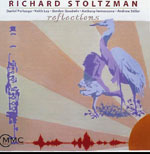Had this sort of collection been released a few years ago, it wouldn’t have been nearly as much fun: It would have been full of 12-tone angst. But times have changed (for the better!) and these five free-spirited American composers have found intriguing ways to combine tonality and atonality, melody and dissonance. Above all, it is an extraordinarily well-played and well-produced recording. The Warsaw National Philharmonic Orchestra responds alertly and with stylistic awareness to conductor Jerzy Swoboda and soloist Richard Stoltzman, and the sound is full and detailed.
Jazz influence is present in some works, but as an assimilated aspect of American musical vocabulary. Daniel James Perlongo’s Sunburst consciously evokes John Coltrane, while Anthony Iannaccone’s Concertante has pitch-bending techniques as part of the work’s wider-ranging outlook. Paraph, by Gordon (Dick) Goodwin, is an exultant treatment of one clarinetist’s personal reed-testing figuration, and Keith Lay’s Earth Caoine exploits the clarinet’s piercing highest register in the disc’s most tragic piece. (Caoine, the Irish root of “keening”, means a wailing for the dead.)
Andrew Stiller’s Procrustean Concerto, the program’s strangest work, is in two wildly diverse movements. The first, “Interview with the Dissidents”, breaks the orchestra into voices that don’t ever seem to agree on what they should be doing. Sometimes a referee’s whistle starts a mad, Ivesian scramble, and then a viola appears to lead the clarinet out of the melée by quoting Berlioz’s Harold in Italy. By contrast, the second movement extensively uses hocket, a compositional device originating in medieval music where different melodic strands are tightly interlocked through alternating notes and rests, and whose execution requires precise cooperation among the players. A Chilean melody plays hypnotically in hocket while variations on that tune unfold organically in the orchestra. Meanwhile, the clarinet makes wild atonal utterances before being abruptly deserted by the orchestra and left to wind down by itself.
Besides the music, the disc exemplifies another modern trend: Even though it features Richard Stoltzman, a true super-star of his instrument with many distinguished major-label recordings, this adventurous release is on the distinctly minor-label MMC Recordings. You probably won’t find it in your local record and book chain store. Don’t worry. If you’re reading this, you know how to find the good stuff. And this is good stuff.
































